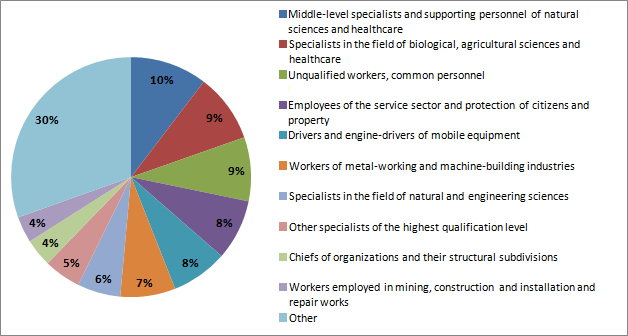Further Education for Harmonizing Regional Labour Market
26.05.2014
The concept of continuous education, which is in operation in Europe, has not become wide-spread in Russia yet, although advantages of further education include not only increasing competitiveness on the labour market, but also active social integration, expansion of business and personal contacts. In accordance with this concept, education continues throughout the whole life, on the basis of the academic system and the system of further professional education, as well as of informal models of training and self-training.
If one considers the structure of Russian organizations’ needs in filling of vacant positions, as of the end of 2012 the share of specialists of the highest qualification level amounted to 24%, including 9% of specialists in the field of biological, agricultural sciences and healthcare. 17% was the share of specialists of the middle qualification level, including 10% in the field of natural sciences and healthcare. The share of qualified employees of industrial enterprises, construction, transport, communications, geology and exploration fields was 16%. The share of unqualified workers amounted to as little as 13%.
Figure 1. Structure of organizations’ needs in filling of vacant positions as of October 31, 2012, %

Source: Federal Service of State Statistics
On the other hand, in 2013 5.5% of economically active population was unemployed, their unemployment having a protracted nature: the average period of looking for a job was over seven months. Such a long period can be a result of discrepancy between demand and offer on the labour market.
In Russia it is planned to create a network of multifunctional centres of applied qualifications, which will implement educational programs oriented at practical tasks developed with participation of employers in order to train specialists required on the labour market. While choosing program directions in the centres peculiarities of regional labour market and strategic plans for development of the region and the country, as a whole, will be taken into account, which foresee the priority of high-tech spheres of economy. Depending on the orientation either at the regional labour market or certain organizations, one can distinguish two models of a multifunctional centre, the scope of tasks of a center oriented at the regional labour market being wider. One should note that organization of such centers can be implemented by concluding a concession agreement to involve the private sector, as well as on the basis of the existing educational establishments.
For more information, please, see “Business Plan of a Centre for Foreign Languages (with a Financial Model)” by Intesco Research Group.
The given figures were calculated by analysts of Intesco Research Group based on the official statistics.

